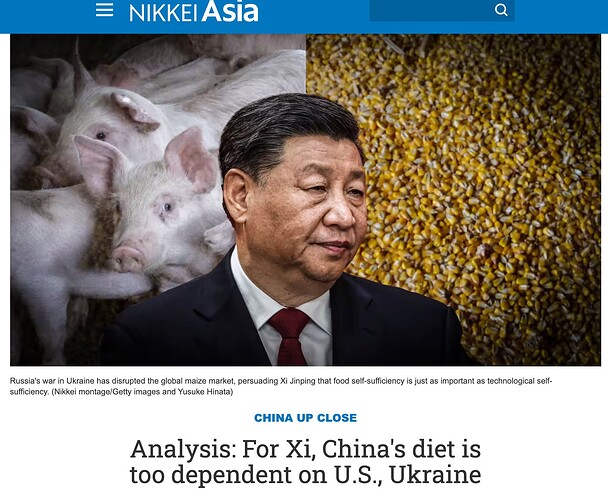-
“退林还耕”是这些天在中国互联网上流行的一个口号。政策的转变是对外部因素的反应,如乌克兰战争、美国领导的针对中国的国际联盟,以及印太经济框架。
-
政策的转变是由于美国学者莱斯特-布朗在1990年代在《世界观察》杂志上发表文章后,需要提高粮食自给率。此后,中国政府开展了提高粮食产量的运动,以及后来的退耕还林政策,这是社会和工业政策的一部分,将人们从内陆地区人口过多的农业村转移到沿海城市附近不断扩大的工业区。
-
2021年,中国70%的玉米从美国进口,30%从乌克兰进口,乌克兰一直是用于榨油的玉米和葵花籽的主要供应商。然而,由于俄罗斯的全面入侵,从乌克兰的进口断崖式下跌,国际谷物价格上涨了一倍多。中国现在依靠进口来满足其总体大豆需求的85%,而美国是最主要的供应商。
-
中国正在使其饮食西化,增加肉类进口,玉米进口来自美国、巴西和乌克兰。
-
在七国集团峰会上,巴西和乌克兰的总统没有会面,因为他们在乌克兰战争中存在分歧,而且他们作为粮食出口国存在竞争关系。
-
中国正在通过将森林开垦为农田来增加粮食生产,并将粮食生产能力提高了5000万吨。
-
中国正在将城市地区的年轻失业者送往农业村,以帮助提高产量。
-
中国国家主席习近平非常了解农业的重要性,他曾在1985年前往美国的粮仓州爱荷华州进行视察。
-
习近平最近在蔡奇的陪同下视察了河北的一片麦田,表明他对粮食安全的重视。
-
中国在粮食方面严重依赖美国,这一点不太可能很快改变。
-
习近平谈到了战斗准备,但他最担心的是中国是否能够获得足够的粮食来维持长期战斗。
-
Returning Forest to Farmland" is a slogan trending on China’s internet these days. The policy shift is a reaction to external factors such as the war in Ukraine, the U.S.-led international coalition against China, and the Indo-Pacific Economic Framework.
-
The shift in policy is due to the need to raise food self-sufficiency rate after U.S. scholar Lester Brown published an article in World Watch magazine in the 1990s. This was followed by the Chinese government’s campaign to increase food production and its later policy of returning farmland to forest, which was part of a social and industrial policy to move people from overpopulated farming villages in inland areas to expanding industrial zones near coastal cities.
-
In 2021, China imported 70% of its corn from the U.S. and 30% from Ukraine, which has been a major supplier of corn and sunflower seeds for oil extraction. However, imports from Ukraine fell off a cliff due to Russia’s full-scale invasion and international prices for the grain more than doubled. China now relies on imports to satisfy 85% of its overall soybean demand, with the U.S. being the dominant supplier.
-
China is Westernizing its diet and increasing imports of meat, with corn imports coming from the US, Brazil, and Ukraine.
-
At the G7 summit, the presidents of Brazil and Ukraine did not meet due to their differences over the Ukraine war and their rivalry as grain exporters.
-
China is increasing food production by reclaiming forests as farmland and boosting grain production capacity by 50 million tonnes.
-
China is sending young unemployed people from urban areas to farming villages to help increase production.
-
Chinese President Xi Jinping is well aware of the importance of agriculture, having gone on an inspection trip to the US breadbasket state of Iowa in 1985.
-
Xi recently inspected a wheat field in Hebei accompanied by Cai Qi, showing the importance he attaches to food security.
-
China relies heavily on the US for food, and this is unlikely to change anytime soon.
-
Xi has spoken of combat preparedness, but his greatest cause for concern is whether China would be able to secure enough food to sustain itself in a long battle.
退林还耕
